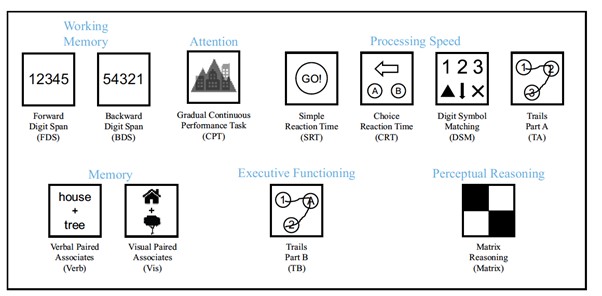- Disruptive Technology Initiative
- / DTI Tech Tips
- / The TestMyBrain (TMB) Digital Neuropsychology Toolkit

The TestMyBrain (TMB) Digital Neuropsychology Toolkit
Authors: McLean Hospital and The Many Brains Project
Synopsis: The TMB Digital Neuropsychology Toolkit (TMB Toolkit) is a set of freely accessible web-based cognitive tests that are developed for self-administration across a range of personal digital devices, with complete and downloadable normative tables and databases derived from data from the millions of participants that have completed cognitive tests through TestMyBrain.org. Educational tools and custom study infrastructure for remote cognitive assessment are also available through the nonprofit The Many Brains Project as part of a related effort.
Author Disclosures: This resource is supported jointly by the Laboratory for Brain and Cognitive Health Technology at McLean Hospital and The Many Brains Project, a nonprofit organization.
Overall Description:
The TMB Toolkit was developed for use by clinicians and clinical researchers. It offers access to a set of cognitive tests that were determined to be the most clinically useful as measurements to supplement traditional neuropsychological assessment. Toolkit infrastructure includes the ability to build custom test batteries for individual patients, as well as retrieval of raw, summary, and normative data for each patient using an ID that is created at the same time as the battery link. No participant identifying information is collected. Please contact info@manybrains.net for more information about Using the TMB Digital Neuropsychology Toolkit and the TestMyBrain cognitive tests.
Case Study Example:
This technology can be helpful in expanding the scope of traditional neuropsychological testing. Digital technologies can capture unique cognitive abilities that are not typically assessed in an evaluation. TMB tests include additional measures of performance not traditionally captured in neuropsychological assessments, such as reaction time and within-test variability, which can be used as additional measures of performance validity/engagement.
Helpful Links: Links to further reading/material and references
Singh S, Strong RW, Jung L, Li FH, Grinspoon L, Scheuer LS, Passell EJ, Martini P, Chaytor N, Soble JR, Germine L. (2022). The TestMyBrain Digital Neuropsychology Toolkit: Development and Psychometric Characteristics. J Clin Exp Neuropsychol pdf
Singh, S., & Germine, L. (2020). Technology meets tradition: A hybrid model for implementing digital tools in neuropsychology. International Review of Psychiatry.pdf
Limitations:
These tools were built for research and not for diagnostic purposes. There is a lot we don’t know regarding how well our norms generalize across testing contexts, patient populations, or sociodemographic characteristics. We ask users to please use their discretion as clinicians when deciding how and if these tests are useful.
Justice, Equity, Diversity, Inclusion Issues: The ability to offer scalable, remote assessments facilitates of neuropsychological services. It enables greater access to individuals who are not in areas with neuropsychological services (i.e., rural/remote or underserved areas), allows those with physical disabilities to be assessed without leaving their homes, and increases overall data capture, which will allow for more expansive normative data in the future.
This is great and something that I’ve never heard of previously. My only question after reading this is what kind of hardware/software requirements there are, such as how slow internet speed might apply to the CPT, for example.

Comments/Experiences to Share?
Dear AACN members, please log in to share your comments or questions here.
